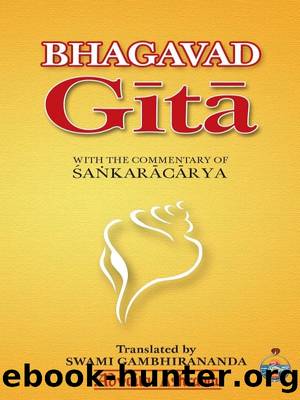Bhagavad Gita: With the Commentary of Shankaracharya by Swami Gambhirananda

Author:Swami Gambhirananda [Gambhirananda, Swami]
Language: eng
Format: epub
Publisher: Advaita Ashrama
Published: 2018-09-29T18:30:00+00:00
* * *
FOOTNOTES AND REFERENCES
[40] âFrom You have been heard the origin and dissolution of beings in You.â
[41] The power of accomplishing the impossible.âM.S.
[42] Hari: destroyer of ignorance along with its consequences.
[43] With abundant respect and devotion.
[44] âI do not seeâbecause of Your all-pervasiveness.â
[45] Siddha: A semi-divine being supposed to be of great purity and holiness, and said to be particularly characterized by eight supernatural faculties called siddhis.âV.S.A.
[46] SÄdhyas: A particular class of celestial beings.âV.S.A.
[47] M.S., Å., and Å.S. construe âcompletely...heatâ to qualify âfierce raysâ in the second sentence. However, the use of kim ca (moreover) in the Comm. suggests the translation as above.âTr.
[48] Time: The supreme BhagavÄn with His limiting adjunct of the power of action.
[49] Pravrddhah, mightyâaccording to Å.âTr.
[50] Atirathaâsee note under 1.4â6.âTr.
[51] i.e. not narrow-minded.
[52] See footnote 19 of Chapter 1.âTr.
[53] Dissatisfaction with only a few salutations.
[54] Asá¹. reads âÅatru-vadha-visaye, in the matter of killing an enemyâ.âTr.
[55] Walking, that is, sport or exercise.
[56] He is the Teacher since He introduced the line of teachers of what is virtue and vice, and of the knowledge of the Self. And He is greater than a teacher because He is the teacher even of Hiranyagarbha and others.
[57] The elision of a (in arhasi of priyÄyÄrhasi) is a metrical licence.
[58] The word Ätmanah (who am the Self) does not occur in some editions.âTr.
[59] âBy anyone who has not received My graceâ.
[60] This separate mention of the study of sacrifices is necessary because the ancients understood the study of Vedas to mean learning them by rote.
[61] A religious observance or expiatory penance regulated by the moonâs phases. In it the daily quantity of food, which consists of fifteen mouthfuls at the full-moon, is curtailed by one mouthful during the dark fortnight till it is reduced to nothing at the new moon; and it is increased in a like manner during the bright fortnight.âV.S.A.
Download
This site does not store any files on its server. We only index and link to content provided by other sites. Please contact the content providers to delete copyright contents if any and email us, we'll remove relevant links or contents immediately.
| Chakras | Gandhi |
| History | Rituals & Practice |
| Sacred Writings | Sutras |
| Theology |
Fingersmith by Sarah Waters(2011)
Kundalini by Gopi Krishna(1824)
The Bhagavad Gita by Bibek Debroy(1668)
Indian Mythology by Devdutt Pattanaik(1624)
Wheels of Life by Anodea Judith(1609)
The Yoga of Jesus: Understanding the Hidden Teachings of the Gospels by Paramahansa Yogananda(1528)
The Man from the Egg by Sudha Murty(1500)
Autobiography of a Yogi (Complete Edition) by Yogananda Paramahansa(1488)
Chakra Mantra Magick by Kadmon Baal(1387)
The Book of Secrets: 112 Meditations to Discover the Mystery Within by Osho(1354)
Avatar of Night by Tal Brooke(1258)
The Sparsholt Affair by Alan Hollinghurst(1245)
Sparks of Divinity by B. K. S. Iyengar(1227)
Karma-Yoga and Bhakti-Yoga by Swami Vivekananda(1221)
The Bhagavad Gita (Classics of Indian Spirituality) by Eknath Easwaran(1207)
Gandhi by Ramachandra Guha(1196)
The Spiritual Teaching of Ramana Maharshi by Ramana Maharshi(1175)
Skanda Purana (Great Epics of India: Puranas Book 13) by Bibek Debroy & Dipavali Debroy(1139)
Hinduism: A Very Short Introduction (Very Short Introductions) by Knott Kim(1120)
